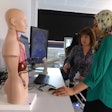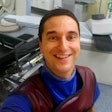
Urology residents in Europe are shockingly unaware of the dangers of radiation exposure and the importance of using radiation protection when performing fluoroscopy-guided endourologic procedures, if results from a survey of members of the European Society of Residents in Urology (ESRU) are indicative of the group.
About half of the respondents did not know that radiation exposure from diagnostic imaging examinations can cause cancer, according to findings published in the January issue of Urology (Vol. 81:1, pp. 30-36). While the response rate to a questionnaire sent to 1,184 urology residents was relatively low (10.5%), the study's finding should raise alarms in medical schools and hospitals throughout Europe.
The questionnaire was emailed to residents in university, state, research, and private hospitals from November 2011 and January 2012. It included questions about demographics and the frequency of radiation exposure, as well as the use of radiation safety practices. Questions included the use of protective gear, measures to reduce radiation from a C-arm and fluoroscopy time, and measures to extend the distance between the residents and the fluoroscopic equipment. The residents were also questioned about their knowledge of diagnostic imaging modalities and the education they had received about radiation exposure.
A total of 124 urology residents responded from 20 different European countries. Two-thirds of the respondents were from Germany, France, and Poland. All reported that they were routinely exposed to ionizing radiation, and almost three-fourths of them were exposed to more than three endourologic procedures a week.
Three-fourths reported that they always used lead aprons, but the use of other radiation protective measures, such as thyroid shields, dosimeters, eyeglasses, minimal fluoroscopy time, and extended distance, was low. Almost 90% had never used leaded gloves, and 83% had never used protective eyeglasses.
Half of the respondents had never read an article about ionizing radiation, and nearly half had never taken any course in radiation safety. Reported radiation course attendance was highest among Polish respondents and lowest among residents in Turkey.
Lead author Dr. Haluk Söylemez, from the urology department of Dicle University in Diyarbakır, Turkey, and co-authors discovered a correlation between residents who took a radiation safety course and the use of radiation protection measures. They recommended that efforts to raise awareness about radiation hazards should be implemented at the time a student enrolls in medical school, and reinforced each year with a comprehensive training program about radiation protection.
The authors also noted that course content should include basic information about ionizing radiation doses of diagnostic imaging exams. "Approximately half of responders had no idea that commonly used imaging modalities have a fatal cancer risk," they wrote. The survey responses also revealed that one-third of the respondents did not know that ultrasound exams did not emit radiation.
















